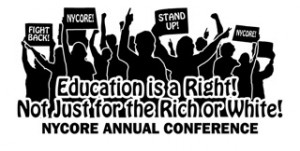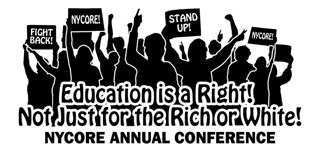What’s Race Got to Do with Charters?
Current data demonstrate that the educational system is failing our students and that reform is necessary. Many in the political and corporate sectors see, and advocate for, charters as an expedient way to turn around public education—we call this the Charter School Movement (CSM). The CSM contributes to an increase in school segregation, favors curriculum driven by standardized testing, and transfers school governance to privately-funded management organizations. This is of particular concern for racially and economically marginalized groups because charters enroll a disproportionately high percentage of African American students and more than 55% of charter schools are in urban settings. [i]While a few individual charter schools are democratic and anti-racist the CSM, as a whole, maintains and furthers a structurally racist and anti-democratic system.
What’s wrong with the Charter School Movement?
- Recent studies indicate that a significant number of charter schools perform, similarly, or worse than their matched-public schools. The CSM thus falsely promotes charters as an effective fix.
- The CSM exacerbates segregation in US schools and neighborhoods. In NYC:
- Blacks make up 30% of the enrollment in the school system, but 60% of the enrollment of charter schools; Latinos, who account for 40% of the enrollment of public schools, represent only a third of the charter school population; and only 5% of charter students are classified as English Language Learners (ELLs), compared with 15% of public school students over all.[ii]
- Emerging Bilinguals (EBs), students who receive Special Education services, and students who are identified as disciplinary problems, are often excluded from, or pushed out of, charter schools. As a result public schools are disproportionately populated with students who have a right to necessary services but are often unable to receive them because of budgets cuts, layoffs, and closures.
- Many charters focus on standardized tests, partly to demonstrate adequate test results to maintain their charters. Test-driven curriculum does not provide for critical thinking, creativity and democratic participation. This disproportionately deprives students of color of essential educational experiences.
- Boards of directors that may not represent the community’s interests make central decisions in charter schools. These business leaders turn schools into a marketplace that limits or negates participation from school staff, unions, community-based organizations, and families.
- The CSM is supported by local government through the provision of space and access to materials/resources. This takes away funding and resources from public schools that are already unable to meet the needs of all of its students.
- The CSM creates conflict within urban communities. The recent NAACP/UFT law suit to stop the co-location of 18 charter schools led to verbal mud-slinging with race being used and misused. Racially charged conflict only serves to cloud the real issues and prevents community-led change.
NYCoRE Demands:
Instead of focusing on expanding charter schools we want the state and city to fully fund quality public schools for all students of all backgrounds. These public schools should be community-based, where school governance and management of resources is based on democratic decision-making involving students, family, community members, and school staff. All students will be given the chance to succeed regardless of their performance and not to be punished with expulsion for “poor performance”. These public schools must support and provide space for teachers and staff to collectively organize in unions. They should also collaborate with each other to share best practices and improve education for all.
Citations & Resources Below (more forthcoming)
[i] US DoE “Condition of Education 2011” report.
 AN INCREDIBLE EVENT!
AN INCREDIBLE EVENT!



